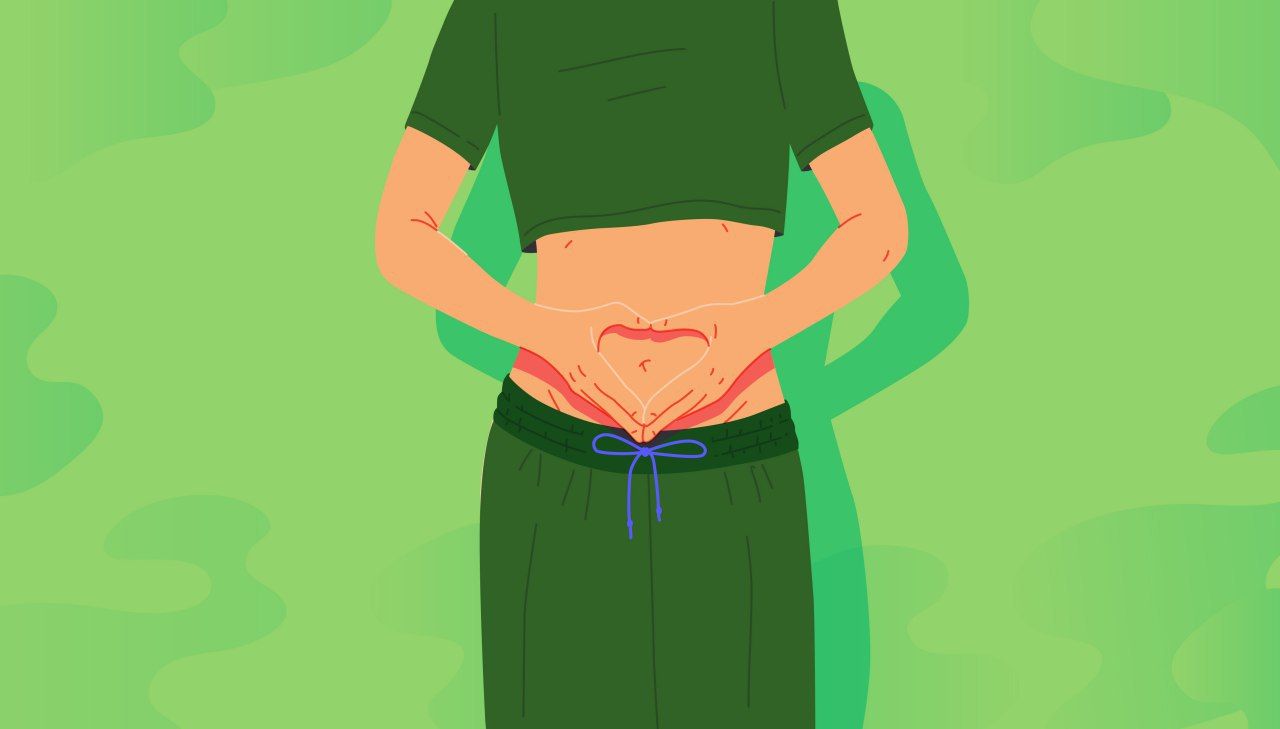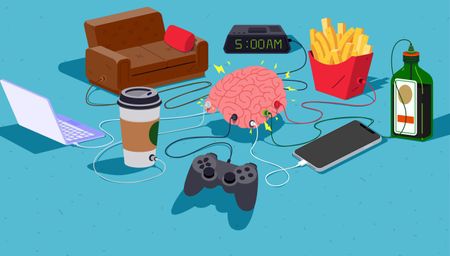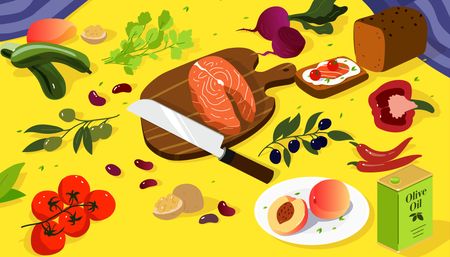Changing our way of eating can help fix digestive problems and improve overall health.
“Sometimes it’s the simple things that make a huge difference,” says Julia Davies, nutritional therapist specialised in chronic inflammatory and autoimmune conditions.
Joining forces with Ollie Gallant, they are working to undo some diet myths and help people make changes to their diet and lifestyle for better digestion, microbiome health and overall wellbeing.
But it doesn’t have to be that way. That’s why the Gutology duo are sharing some of their top tips to start your journey to recovery by deconstructing the myth of stomach acidity, presenting some basic principles of physiology and explaining why the ketogenic diet is not a panacea for all ills.
| 1. | Prepare your food |
| 2. | Chew your food |
| 3. | Don’t use mouthwash |
| 4. | Low stomach acid |
| 5. | Keto isn’t for everyone |
| 6. | Keep a food diary |
Disclaimer: No statement in this article is designed to override any advice by your medical doctor and should not be relied on as a substitute for specialist dietary advice. If you have any concerns about your health, visit your general practitioner, or medical consultant.
1. Prepare your food
Traditionally, we humans have prepared our food and our body is actually designed around this essential step on our journey to satiating hunger.
But time has become a precious commodity nowadays with our hectic urban lifestyles, long work hours, commuting, stress and easy access to take-away, premade and processed foods.
Yet, just thinking about food sets the ball rolling, triggering a cascade of events involving hormones and chemical signals that prepare your body to receive food. It’s called the cephalic phase of digestion.
Photo by Icons8 team / Unsplash
Your senses are the first stage of healthy digestion: they literally getting the juices flowing. Wafting smells, seasoning and thinking about food send signals to our vagus nerve that tells the mouth produces more saliva and your stomach to secrete digestive juices.
If you grab a sandwich at your desk, or eat standing up while talking on your phone, your body is not thinking about eating because it’s distracted with the tasks at hand.
☝️Tip☝️ Try to set aside some time for each meal, when possible making it from scratch, to prepare purposefully and mindfully for the important act of eating.
2. Chew your food
Digestion starts in the mouth. Your teeth and saliva are the first in a long line of processes that your body uses to break down food.
Your teeth, jaw and cheek muscles are specifically designed to exert mechanical pressure on the food, turning big chunks and pointy bits into softer, smaller bits, ready for your stomach and its acid bath.
Saliva is full of enzymes that kick off several processes too. The enzymes start the chemical reactions that break down food, which are continued in the stomach by the acid secreted there.
Chewing is also vital to the next stage because it tells the stomach to ramp up acid production in preparation for the arrival of your meal.
☝️Tip☝️ Your body is an integrated organism, and that is why chewing mindfully can enhance the entire chain of reactions involved in digestion.
3. Don’t use mouthwash
Our body has lots of distinct microbial ecosystems, called microbiomes, that play a role in our health. In fact, the mouth actually has several distinct groups of bacteria that live in different parts of the oral cavity.
And since we’ve evolved in symbiosis, this transfer is nothing unusual, or alarming. But by disrupting the oral microbiome with mouthwash, we may be inadvertently disturbing a larger chain of events.
There are actually different microbial communities living on different parts of our mouth: the bacteria that live on your teeth are different to those on your gums, tongue, cheek, lip, and hard and soft palate. But when you use mouthwash, it can disturb all of them.
And just like the gut, the mouth can also experience dysbiosis: negative alterations in the communities of microbes that can lead to inflammation, better known as periodontitis. In fact, severe periodontitis is known to affect glycemic control (how the body regulates blood glucose levels) in diabetes and non-diabetics alike.
Furthermore, researchers suggest that oral dysbiosis may influence a variety of diseases including cardiovascular disease, inflammatory bowel disease and colorectal cancer.
☝️Tip☝️ Try oil pulling with coconut oil for 15 minutes first thing in the morning. It collects a lot of the bacteria that accumulated overnight but has less impact on the oral microbiome.
4. Low stomach acid
Contrary to popular belief, heartburn and acid reflux are often caused by low stomach acid. For this organ to do its job properly, the pH needs to be highly acidic (pH 1.5–3.5). This allows us to break down our food - especially protein, which is by reputation hard to digest.
High acidity provides a barrier against bacteria that can usually only survive in it for up to 15 minutes. But when you have low levels of acidity, or you take medication to prevent acid reflux that lower stomach acidity, bacteria can survive and start breaking down food in your stomach instead of acid.
In The Acid Myth episodes, Julia and Ollie discuss the signs, risks and solutions for low stomach acid.
This causes gas to build up, increasing pressure on your stomach that can push open the sphincter at the top of this organ. The stomach contents can move upwards, back into the oesophagus where they came from, causing burning and discomfort.
This can also pose a problem for accessing an essential nutrient, vitamin B12, that is only found in animal-derived foods. This is because stomach acid is vital when breaking down protein and accessing the vitamin B12 it contains.
One telltale sign of low stomach acidity are soft, weak fingernails. They are made of protein, but if the body isn’t able to break down protein efficiently, it can result in brittle nails.
☝️Tip☝️If you find animal protein hard to digest or suffer from chronic acid reflux, you may have a problem with low acidity. Find out more in our episode The Acid Myth .
5. The Keto diet is not for everybody
Ketogenic diets are ubiquitous online: we have all read miracle healing transformations of this diet solving everything from allergies to IBS. However, it’s important to remember that it was once a medical tool conducted under the supervision of a medical professional.
The ketogenic diet consists primarily of fats and protein, with very limited carbohydrate intake. In addition to limiting carbs, it excludes specific types of plant foods like whole grains, fruit, legumes and tubers depending on the plan you follow.
And while this may help weight loss and possibly play a role in many diseases, often the internet claims are far more assertive than the science behind it. And there are other consequences that have yet to make mainstream headlines.
Photo by Sara Dubler / Unsplash
One of the ketogenic diet side effects is caused by the strong restrictions put on carbohydrates that can negatively affect the gut microbiome.
The healthy and diverse microbiome trains the immune system and has anti-inflammatory functions. Microbes of the Firmicutes genus produce short-chain fatty acids that help preserve the integrity of the gut lining. Probiotic strains of bacteria like Bifidobacterium and Lactobacillus prevent pathogenic microbes from colonising the gut and making us sick.
However, studies of how the gut microbiome changes on a ketogenic diet show it has a negative impact on the diversity of our gut microbes. Some of the changes noted included less Firmicutes, lower levels of probiotic bacteria and higher levels of Escherichia coli as well as Proteobacteria that are implicated in the emergence of several diseases.
☝️Tip☝Try a short-term elimination diet that eliminates inflammatory foods, and reintroduces them slowly to identify specific food triggers.
6. Keep a food diary
Many of us suspect that food may be the cause and the solution to our problems, digestive and otherwise. But what food?
There are some many possibilities: foods, compounds, interactions, organs and microbes; that it can be hard to distinguish what is relevant from what isn’t. Even when you’re an expert.
That’s why the first step to finding the personalised solution for you is to identify the root cause, and a food diary is an excellent tool. Whether you’ve decided to go it alone and figure out where it’s going wrong, or you want to consult a nutritional therapist like Julia Davies.
Keeping a food diary allows you to log the foods you’ve eaten and make notes on how you feel afterwards. If you eat a steak, do you feel like it’s sitting in your stomach for hours? Do you get gassy after a glass of milk? Feeling lethargic after a slice of cake?
When you record your eating habits and symptoms for a week or more, it’s easier to identify patterns and trends in your symptoms, for you and your healthcare provider. These clues can streamline the journey to health, by eliminating dead ends and unnecessary tests to start your recovery sooner.
☝️Tip☝️Get a free 6-week to optimise your gut health when you sign up for Gutology updates. It includes a guide to making a food diary and what questions to ask yourself.
- JJ Heidelbaugh, Proton pump inhibitors and risk of vitamin and mineral deficiency: evidence and clinical implications, 2013
- G Iorgulescu, Saliva between normal and pathological. Important factors in determining systemic and oral health, 2015
- M Killian et al., The oral microbiome – an update for oral healthcare professionals, 2016
- R Singh et al., Influence of diet on the gut microbiome and implications for human health, 2017






















